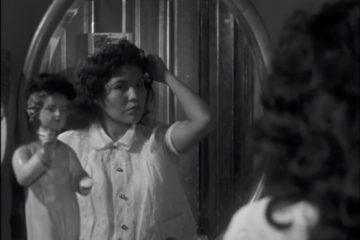


The doll placed next to Yvonne as she fixes her makeup (fig. 1) could be seen as representing her as also childish. However, the mise-en-scene is here less judgemental, presenting her as aspirational rather than adolescent like the men, with ‘dreams of a middle-class life with a good man’ (Koehler, 2008). These are reminiscent of the schoolgirl fantasies of the ideal life taught in American schools and culture but she is stuck in a working-class life with an unambitious husband. However, more likely, the doll could represent Yvonne’s maternity as her pregnancy is referenced repeatedly in the film and she fulfils a motherly role cooking for the ungrateful, childish men. Also, she carries the groceries maternally, cradling them like a child, and the only visible grocery in the bag are eggs, a symbol of female fertility (fig.3). The seemingly incidental, but actually quite intricate, mise-en-scene in this sequence of The Exiles portrays unequal gendered difference. In particular, a tight restrictive framing of the oppressed and lonely Yvonne is juxtaposed with the open framing of the men, with stereotypically gendered props used to represent a domestic, motherly femininity compared to an immature but powerful masculinity.
References
Benshoff, H. and Griffin, S. America on Film: Representing Race, Class, Gender, and Sexuality at the Movies. Wiley Blackwell: 2009. Print.
Koehler, R. (2018). ‘The Exiles‘. cineaste.com. 2008. Web. 14 Mar. 2018.
L’Etang, J., McKie, D., Snow, N., and Xifra. J. The Routledge Handbook of Critical Public Relations. Oxford: Routledge, 2016. Print.

Jake Thompson is a BA Hons film student at QMUL. He is from Shrewsbury, Shropshire and in his spare time he likes to play football and go to live music events. In the future he hopes to have a creative writing role within the film industry.
Please obtain permission before redistributing. Copyright © 2018 Jacob Thompson